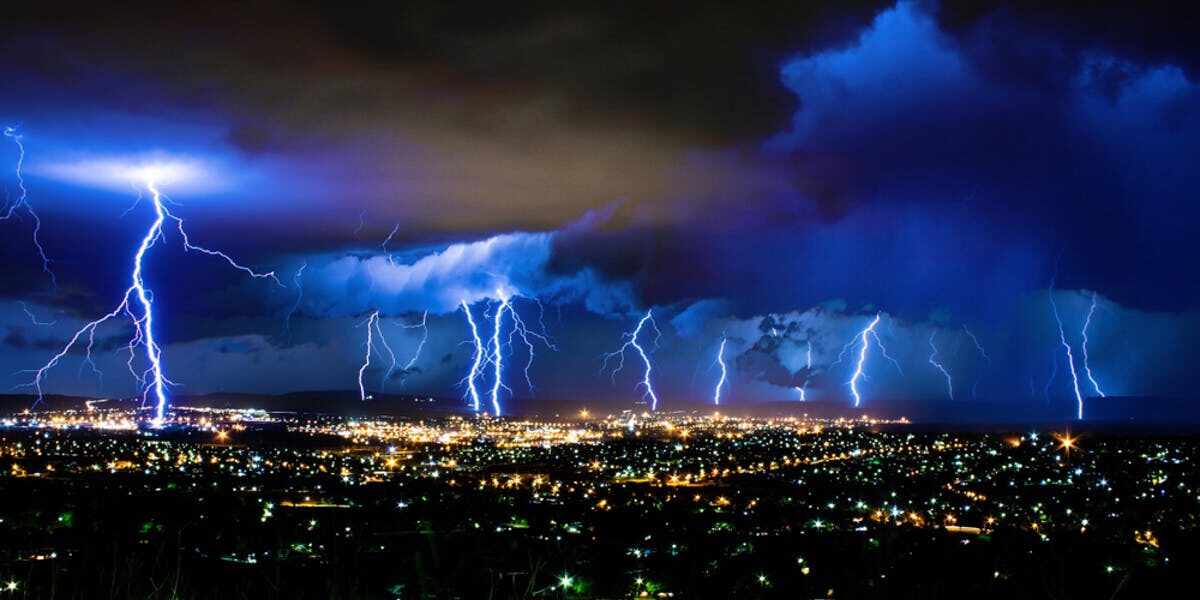
This post comes to us from Millie Sweeny:
Rumbling thunder and the towering dark ships of storm clouds were the backdrop to much of my growing up. Appearing at football games and pool parties, these summer storms are part of the rhythm of life in the South and are (usually) not worrisome. But, as a sensitive and anxious child, I became tense every time the sky darkened. The darkness, the lack of control, even the absence of worry in anyone else in my home, festered in my over-imaginative mind and became a lonely terror. I could not apply the words of those I trusted to the emotions I felt, and my fear ruled me until the storm passed and the light broke in again. The nights were long. As I grew up, of course, I learned that these rhythms of nature are (mostly) not dangerous, and so I stopped being afraid. The dark and stormy nights were no longer my dark nights of the soul. Mostly.
Last night, I couldn’t sleep. The rushing wind and pelting rain, once familiar, are foreign to me and to the ground I now call home. It rains all the time in the Pacific Northwest, sure, but it rarely storms; I can count on one hand the number of times I have heard thunder on this coast. Despite the hundreds of times I ignored the whispering pines in my youth, I couldn’t keep my mind from running around our current yard, counting and naming each of the behemoth twisted oaks, the towering firs. Through their reaching arms, the unfriendly wind shrieked, spraying raindrops like bullets against the windows. Worst of all, the sporadic thuds and thumps of things outside in the dark, falling and rolling.

Annie Dillard, in The Writing Life, tells of the inchworm, step by step advancing up a blade of grass. At each step, he throws up his (metaphorical) hands, flailing around, uncertain of the next step. He cries out, “What? No further!” before dropping down to take one more step, and then repeats the whole process. I need not tell you how often, how daily, this inchworm is me.
The thing about anxiety is that you’re keenly aware of it. The thudding of the blood in your ears, the speeding up of your heartbeat so you can literally watch it thump under your shirt, the cold in your fingers and up your spine — you feel all this happen, and are powerless to stop it. Reason has no voice here, nor does truth. My body senses danger, and my body overreacts. My mind last night was a ridiculous back-and-forth between imagining all sorts of horrible scenarios that mostly involved giant trees falling on my children’s bedrooms (the voice of irrational anxiety), and the gentle voice of prayer and the scriptures (my rational mind). Carnage and peace, fighting it out in my adrenaline-buzzed mind. What? No further!
This morning the sun broke through with such glory I couldn’t even see our backyard, so dazzling was its rising brightness, reflected on the residual raindrops strewn across the grass, each shining like glass. A few twisted, lichen-covered branches lay here and there, like mossy skeletons among the new carpet of fallen leaves. Otherwise, there was no sign of the storm. No scars to mark the passing of such fury.
I am trying to memorize and pray the ancient words of Compline before I sleep (thanks to a rereading of Walter Wangerin’s The Book of Sorrows and, of course, to Tish Harrison Warren’s new book), and I did so before this long, sleepless night. There are several different collects in the Book of Common Prayer, but this was the one on my mind:
Be present, O merciful God, and protect us through the hours of this night, so that we who are wearied by the changes and chances of this life may rest in Your eternal changlessness; through Jesus Christ Our Lord. Amen.
There are many, many storms and many, many nights in which we lie awake, wondering what the morning will bring. Nights in hospital rooms, in empty houses, on crowded airplanes, at desks strewn with papers, where the changes and chances of this life howl against our troubled hearts. We do not often feel this peace as we lie awake, listening to the wind crashing against the walls of our security like waves against a sandwall. The words of the psalmist, who lay awake to meditate on the Law, feel just out of reach, outside the murky clouds of anxiety. But they are there.
Yet none of these gut-buzzing worries negate the promises of rest given in Scripture and echoed by the saints in their historic prayers. No wind can drive them out, no rain can wash them away, no disease consume them. Even though the bitter watches of the night feel like the edge of a chasm — What? No further! — they are more often the walls of a canyon, hemming in a valley of shadow through which our God promises to bring us.
Whether the morning brings downed trees or sunshine, heartbreak or relief, resurrection or another weary day of waiting, we who are aching in the chances and changes of life are promised rest in Jesus Christ our Lord.
What? One step further.

COMMENTS
2 responses to “Storms in the Night”
Leave a Reply













Thanks for this insight, Millie! I actually just had a lunch break walk full of anxious prayers and ramblings as I transition into a middle school teaching position for my first time and mid-pandemic. Ha! The promise of rest is a gift. Thank you.
As a terrible sleeper, and anxious person generally, I really appreciate this post!